Dec 18
2020
Why Providers Need Analytics To Prepare Today For The Aftermath of The Coronavirus
By Andrea Sorensen, associate vice president of product consulting, MedeAnalytics.

Healthcare providers on the front lines of the coronavirus pandemic continue to be overwhelmed by the increase of cases worldwide. Physicians, nurses and other direct providers are overworked, tired and mentally exhausted from non-stop diagnosis and treatment during the pandemic. And just as the number of new cases seems to decrease, they rise again.
In the US alone there are more than 10.3 million cases and 241,000 deaths. Worldwide, cases number more than 51.8 million with more than 1.2 million deaths. These numbers, undoubtedly, will continue to grow in the coming months. “By June 2020, the COVID-19 pandemic had caused hundreds of thousands of deaths around the world, triggered the largest quarterly contraction of global GDP ever recorded, and left hundreds of millions of people without jobs,” according to research published by the McKinsey Global Institute.
Physicians, nurses and other healthcare providers are not immune from the coronavirus. From its deadly effect or the mental health impact of dealing with the pandemic each day. To date, more than 922 healthcare works in the US likely have died following contact with patients. “America’s health care workers are dying. In some states, medical personnel account for as many as 20% of known coronavirus cases. They tend to patients in hospitals, treating them, serving them food and cleaning their rooms,” according to KHN and The Guardian.
Overall healthcare providers, like those of us in society in general, are extremely stressed by the coronavirus pandemic. A study published in Psychiatry Research found “(o)f all 442 participants, 286 (64.7%) had symptoms of depression, 224 (51.6%) anxiety, and 182 (41.2%) stress. Being female, young, and single, having less work experience, working in frontline were associated with higher scores, whereas having a child was associated with lower scores in each subscale.”
But statistics aren’t necessary to understand that healthcare providers will continue to face substantial anxiety and rising tension for the foreseeable future. “Health-care providers were challenged by working in a totally new context, exhaustion due to heavy workloads and protective gear, the fear of becoming infected and infecting others, feeling powerless to handle patients’ conditions, and managing relationships in this stressful situation,” The Lancet reports.